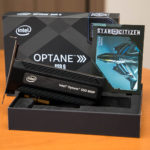So the Intel Optane SSD 900P NVMe SSD has been out for about a week now and it is expensive, hard to find and being termed as a disruptive technology by the SSD Gods. By SSD Gods of course, I refer to 4-5 flash reviewers that have been in the industry since SSDs were introduced and I can draw a direct …
Read More »Tag Archives: AS SSD
Toshiba TR200 SSD Review (240GB/480GB/960GB)
If you have been following the storage market over the past year, you may have noticed that OCZ has yet to release any products since the VX500. As a matter of fact, with the NAND shortage, there have been fewer SSD releases across the industry. The guys who own the NAND fabs such as Micron, Intel, Samsung, Hynix, and of course …
Read More »Plextor M8Se NVMe SSD Review (512GB)
It has been quite some time since we have reviewed a product from Plextor. In September of 2015 we took a look at the M6V, an entry-level SATA based SSD and before it, their flagship M6e Black edition, one of the very first NVMe SSDs in the market in the beginning of 2015. But, as of late, nothing…at least until now. …
Read More »ADATA Ultimate SU900 SSD Review (512GB) – 3D MLC, But At What Cost?
Last year, we reviewed ADATA’s Ultimate SU800. It was the second SSD in the market to utilize Micron’s 3D TLC NAND and paired with an SMI SM2258 controller, it made out to be a fairly good performer. This year we now have the Ultimate SU900 in hand. Just as the name suggests, it does rank above the SU800. The ADATA …
Read More »HighPoint SSD7101A-1 NVMe RAID Controller Review – Samsung and Toshiba M.2 SSDs Tested
When it comes to storage management, RAID configurations of some kind have proven to be top dog when it comes to performance. This was initially shown in our report of the Intel 910 PCIe SSD way back in 2012 and, more recently, with the Kingston DCP1000 NVMe SSD that reached 7GB/s throughput and over 1 million IOPS. The Kingston DCP1000 …
Read More »BIOSTAR G330 SSD Review (256GB)
BIOSTAR isn’t the first name to come to mind when thinking about SSDs. Even for us, we didn’t even recall ever seeing a BIOSTAR SSD until today. They aren’t entirely new to the game, however. Last year at about this time, they released their first SSD, the G300. Utilizing SMI’s popular 2256 controller at the time, it put out some …
Read More »Samsung Portable SSD T5 Review (500GB/2TB) – The Industry Standard
Our report today is on Samsung’ newest T5 2TB and 500GB SSDs, and at this point in the game, few might argue that Samsung sets the industry standard in all that is SSD. Including a 2TB capacity into their newest T5 release, as they did for the T3 prior, one might say that 2TB is also the norm… but knowing …
Read More »Corsair Neutron NX500 NVMe SSD Review (400GB)
Back in February, Corsair released one of the fastest NVMe SSDs into the market, their Force MP500. This SSD delivers more than enough performance to cover the needs of the majority of PC enthusiasts, however, with a rather typical 3-year warranty and fairly high price tag, it was just shy of earning our Gold Seal. Since then, Corsair has been …
Read More »Kingston DCP1000 NVMe SSD Enthusiast Testing in RAID 0 – 2 Mil IOPS and 14GB/s
Not so long ago, we introduced you to what just might be the fastest NVMe storage device on the market right now. Our tests of the Kingston DCP 1000 1.6TB NVME PCIe 3.0 displayed absolutely incredible performance of 7GB/s and 1 million IOPS for a single drive, and our initial enthusiast report uncovered an amazing design package beneath the surface …
Read More »Intel SSD5 545s SATA 3 SSD Review (512GB)
It was some time ago that even the mention of TLC NAND flash memory could draw forum confrontations so active that they would inflame contributors, most threads containing language that we definitely wouldn’t want children hearing…or reading in that case. Luckily, NAND flash memory has progressed. In fact, this progression is very ‘consumer-centric’ as today’s SSDs, built on the newest 64-layer 3D TLC …
Read More » The SSD Review The Worlds Dedicated SSD Education and Review Resource |
The SSD Review The Worlds Dedicated SSD Education and Review Resource | 

